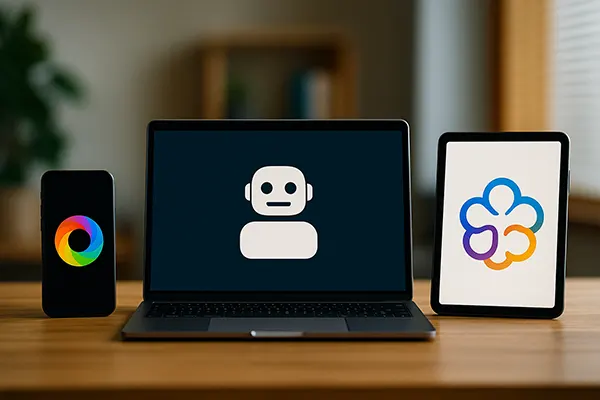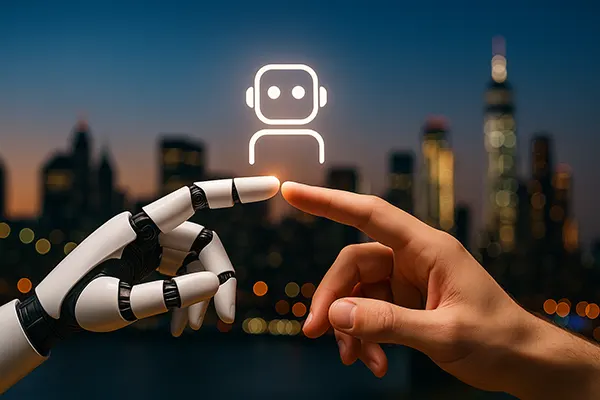Comparison of Google Gemini, ChatGPT and Claude: Which AI to Choose for Daily Tasks in 2025

In 2025, artificial intelligence is no longer a novelty — it’s a tool integrated into everyday routines, academic workflows and business processes. Among the most advanced generative models today, three stand out: Google Gemini, ChatGPT by OpenAI, and Claude by Anthropic. Each of these systems offers unique strengths and may be better suited to different types of users. In this article, we explore how these AI models compare in practice, accuracy, and adaptability, with a clear focus on real-life applications.
Performance in Daily Productivity Tasks
When it comes to writing emails, summarising documents or crafting CVs, ChatGPT (especially the 4o version) shows excellent context retention and polished grammar. Gemini excels at quick search-integrated answers thanks to native integration with Google services. Claude, by contrast, is known for its long-context processing, allowing it to summarise and reason across huge volumes of text — up to 200K tokens in the latest Claude 3 Opus model.
Tests involving structured writing tasks show that ChatGPT performs most reliably in producing professional and balanced content, with clear formatting. Gemini, while quick, sometimes lacks refinement in tone, especially when writing nuanced messages. Claude tends to generate ethically cautious, sometimes overly verbose content, which may suit academia but less so rapid communication.
For students, Claude is particularly strong when used to analyse articles, generate citations and summarise long texts. Gemini is ideal for those already in the Google ecosystem and want fast results. ChatGPT remains the most balanced and consistent choice for writing and revision tasks of medium complexity.
Code Generation and Technical Tasks
Developers frequently use generative AI for code completion, debugging and architectural suggestions. Here, OpenAI’s ChatGPT leads the field with its integration into GitHub Copilot and superior handling of Python, JavaScript and SQL tasks. It can also execute code and analyse output, which makes it useful for quick iterative testing.
Gemini performs well in simple script generation, particularly when users need solutions derived from web data or Google APIs. However, it occasionally produces hallucinated code without clear inline documentation. Claude is less effective at actual code generation but can be valuable when reviewing logic and assumptions in technical specifications.
Those in need of fast, structured code generation with real-time feedback will benefit more from ChatGPT. Claude suits roles requiring critical reading and validation of code, such as QA engineers. Gemini might be helpful for tech-savvy marketers or analysts needing quick scripting solutions.
User Interface and Experience
Usability plays a crucial role when selecting an AI assistant. ChatGPT offers a clean interface with multi-modal inputs (image, voice, text) and plugins via OpenAI tools. Its memory function, introduced in 2024, allows custom instructions and persistent context, improving usability for repeated tasks.
Gemini’s biggest strength lies in its seamless integration with Gmail, Google Docs and Search. However, it still lacks persistent memory and often requires users to repeat instructions. Claude, with its calm tone and context-respecting interface, provides a distraction-free environment, though currently lacks plugin or web-browsing capabilities.
From a design standpoint, ChatGPT is the most advanced in terms of interactivity and support for different file types. Claude’s minimalistic design may appeal to privacy-focused users or those preferring linear conversations. Gemini’s dynamic panels and rapid response times are best suited for quick lookup tasks in web browsers or smartphones.
Multilingual and Cultural Understanding
Language support is increasingly vital, especially for international users. ChatGPT supports over 50 languages with a high level of accuracy in major ones like Spanish, German, Chinese, and French. Its British English mode is particularly refined and grammatically precise.
Gemini shows strength in translation and web-derived context, yet often exhibits inconsistency in less common dialects. Claude’s English output is nuanced, but its performance drops significantly outside this language, especially in Eastern European or Scandinavian languages.
For users dealing with multilingual environments or localisation tasks, ChatGPT is the most dependable. Claude can assist well in interpreting tone and academic prose in English. Gemini is handy when translation needs are light and paired with factual research.

Which AI to Choose in 2025?
For students, Claude is the most suitable model due to its strong capabilities in summarising research, explaining topics in depth and maintaining factual integrity. Its interface encourages deep learning and responsible use of AI tools in education.
For businesses, ChatGPT 4o remains the top pick. With API access, file uploads, team collaboration features and plugin support, it delivers a full suite of tools for drafting, scheduling, and even data interpretation — all from a single workspace.
For daily household or casual tasks, Gemini shines through simplicity. Whether it’s drafting quick shopping lists, setting reminders or querying up-to-date information through Google Search, Gemini offers unmatched speed and convenience.
Final Thoughts on Long-Term Use
Choosing the right AI in 2025 depends on your priorities. If performance, flexibility and rich integrations matter most, ChatGPT is the leader. If deep reading and responsible reasoning are essential, Claude is worth the investment. Gemini stands out for light and fast task execution — particularly when time is limited.
Each of these models is advancing rapidly, and new features are regularly introduced. Users are encouraged to test each assistant based on specific needs and regularly revisit their choice as capabilities evolve.
Ultimately, while there is no universal winner, the diversity of today’s AI landscape offers powerful options for almost any scenario — from writing and research to technical development and daily productivity.




